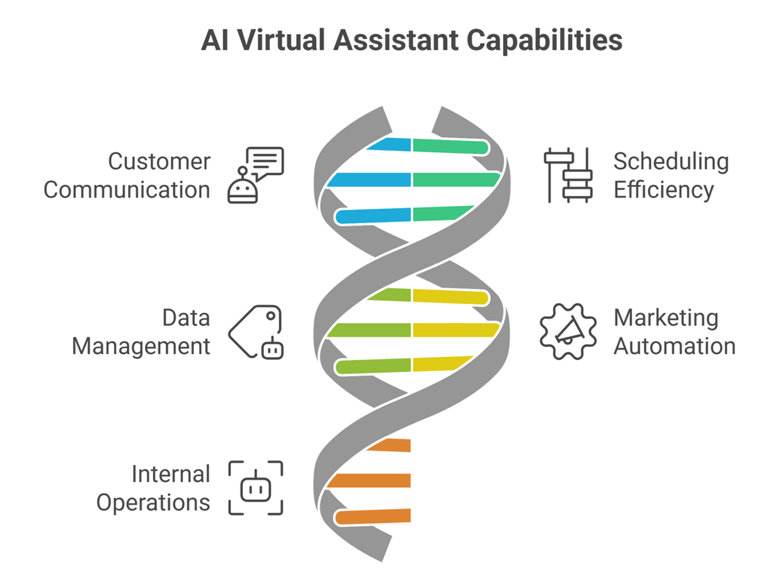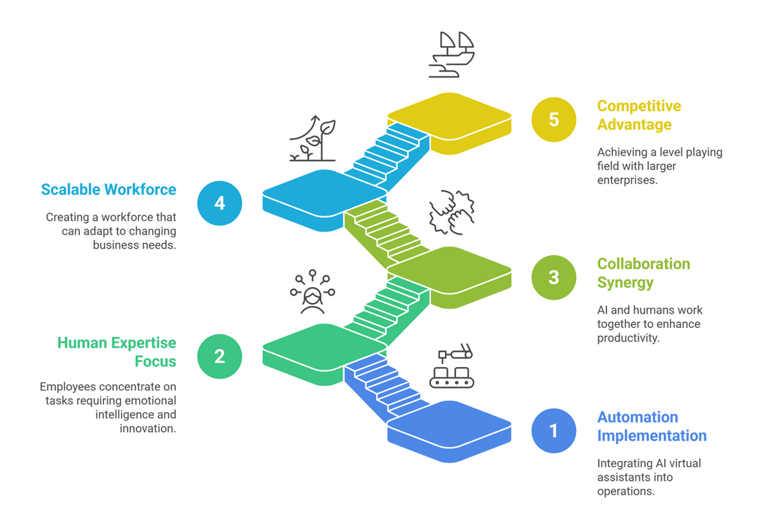How AI Virtual Assistants Are Powering the Future of Business Operations
In today’s fast-moving digital economy, businesses are under constant pressure to do more with less time, less cost, and less manual effort. At TalentMine, we’ve seen firsthand how the rise of AI-powered virtual assistants is reshaping the way companies operate, helping them streamline workflows, boost productivity, and unlock new levels of efficiency across departments.


The New Era of Intelligent Operations
Virtual assistants are no longer limited to answering emails or managing calendars. The new generation of AI virtual assistants has evolved into intelligent digital partners capable of handling complex workflows, automating communication, and even learning from every interaction. These assistants can now take on a wide range of operational roles that once required multiple human touchpoints.
According to a 2024 McKinsey report, companies integrating automation and AI tools into their daily operations have experienced up to a 25% increase in overall productivity. This isn’t just about efficiency; it’s about transforming how work gets done. AI systems learn and adapt continuously, enabling smarter, faster, and more consistent decision-making across the organization.
Where AI Virtual Assistants Make the Biggest Impact
AI-driven tools are transforming every business function by taking over time-consuming and repetitive tasks while maintaining accuracy and reliability.
Anything's possible when you have the RIGHT talent.
1. Customer Communication and Support:
AI virtual assistants no longer just chat — they can now handle voice calls, respond instantly to customer inquiries, and ensure no call goes unanswered. Missed calls often translate to missed opportunities, but with AI, every customer interaction is captured and managed. Beyond this, assistants can answer FAQs, conduct post-service surveys, and deliver a consistent experience that strengthens brand trust.
2. Scheduling and Administrative Efficiency:
AI virtual assistants no longer just chat — they can now handle voice calls, respond instantly to customer inquiries, and ensure no call goes unanswered. Missed calls often translate to missed opportunities, but with AI, every customer interaction is captured and managed. Beyond this, assistants can answer FAQs, conduct post-service surveys, and deliver a consistent experience that strengthens brand trust.


3. Data and Performance Management:
From collecting data to generating analytics-driven insights, AI assistants reduce the burden on human teams by managing repetitive data tasks. They can monitor performance trends, prepare reports, and even alert teams when key performance indicators (KPIs) fluctuate. This enables leaders to focus more on strategy and innovation rather than routine monitoring.
4. Marketing and Sales Automation:
AI virtual assistants can schedule campaigns, track leads, personalize communication, and even follow up with prospects automatically. By analyzing customer behavior patterns, these assistants deliver more targeted engagement and enhance conversion rates without the need for constant manual input.
5. Internal Operations and Workflow Optimization:
In internal operations, AI tools handle everything from onboarding new employees to document organization. They ensure that repetitive tasks like invoice processing, payroll scheduling, and compliance tracking happen consistently and accurately, freeing human employees to focus on creative and strategic tasks.
Building a Smarter Future with AI Integration
The transformation is already underway, and those who act early will lead the future of intelligent business operations.
At TalentMine, we help organizations bring these transformations to life. From AI-powered virtual assistants and smart scheduling tools to automated customer communication, data insights, and performance tracking, our team ensures every business process becomes faster, smarter, and more efficient.
We believe the true power of AI lies in its ability to complement human potential. By integrating intelligent systems into core business operations, companies can achieve more than just productivity, they can create meaningful progress, foster innovation, and build a foundation for long-term growth. The transformation is already underway, and those who act early will lead the future of intelligent business operations.
Human + AI: The Winning Combination:
While automation drives speed and consistency, human expertise remains irreplaceable. Successful organizations understand that AI virtual assistants excel when paired with human oversight. Employees focus on tasks that require emotional intelligence, judgment, and innovation, while virtual assistants handle repetitive and data-heavy work.
This collaboration creates a balanced and scalable workforce, one that operates around the clock, minimizes operational downtime, and adapts to changing business demands effortlessly. For smaller and mid-sized businesses, this synergy also levels the playing field, allowing them to compete with larger enterprises without the cost of expanding headcount.


